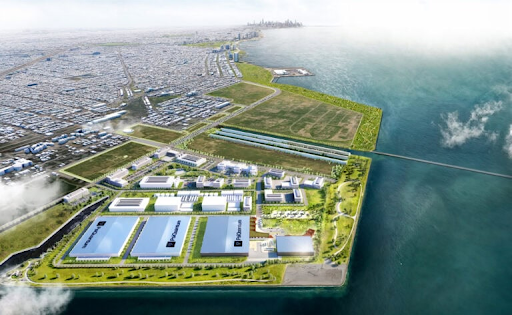The Top 5 Business Trends to Watch in Chicagoland
As one of the nation’s most dynamic economic regions, Chicagoland is undergoing significant shifts driven by technological advancements, urban redevelopment, and evolving market demands. From quantum computing to large-scale infrastructure projects, these trends highlight the city’s adaptability and forward-looking growth.
Here are five key business trends shaping the region in 2025:
1. Quantum Computing Hub Development
Chicago is emerging as a leader in quantum computing, bolstered by the creation of the Illinois Quantum and Microelectronics Park (IQMP) on a 128-acre site previously occupied by U.S. Steel. This initiative is designed to attract key industry players, such as PsiQuantum, and foster innovation in one of the most cutting-edge fields of technology. The project is expected to drive substantial economic growth by positioning Chicago as a hub for next-generation computing advancements.
Rendering credit: Intersectillinois.org
2. Office-to-Residential Conversions
The city is witnessing a growing trend of adaptive reuse of commercial spaces to meet housing demands. In 2025 alone, Chicago is set to convert 3,606 office units into residential properties, reflecting broader shifts in urban planning and real estate. This trend is driven by the post-pandemic evolution of work habits, decreased demand for office space, and the pressing need for more housing options in urban centers.
Proposed rooftop at Continental and Commercial National Bank. Rendering credit: Lamar Johnson Collaborative
3. AI Integration Across Industries
Artificial intelligence continues to be a major driver of business innovation across Chicagoland. Local technology firms are increasing investments in AI solutions, expanding teams, and forming strategic partnerships to enhance business operations. This trend is particularly evident in sectors such as finance, healthcare, and logistics, where automation and AI-powered analytics are improving efficiency and competitiveness.
4. Expansion of the Life Sciences Sector
The life sciences industry in Chicago has seen notable growth, with employment in the sector increasing 7.5% since 2019—outpacing the overall private sector in Illinois. With a strong research ecosystem and a concentration of biotech and pharmaceutical firms, the city continues to position itself as a hub for scientific innovation. Major investments in research and development are expected to further accelerate this sector’s expansion in 2025.
5. Large-Scale Urban Development Projects
Several major urban development initiatives are reshaping Chicago’s landscape, with projects aimed at enhancing residential, commercial, and public spaces. Key initiatives include:
The 1901 Project – A $7 billion development surrounding the United Center, set to create 5,000 mixed-income housing units, a 6,000-seat music hall, hotel space, retail, and public parks, generating an estimated 63,000 jobs.
Rendering credit: the1901projectchicago.com
Lincoln Yards – A planned 14.5 million-square-foot mixed-use community along the North Branch Corridor, incorporating 6,000 new residential units and 21 acres of green space.
Video Credit: https://www.lincolnyards.com/
The 78 – A transformative project designed to create Chicago’s “next great neighborhood,” featuring residential and commercial spaces, a riverwalk, and public parks in the South Loop.
Rendering credit: 78chicago.com
Each of these initiatives contributes to Chicago’s broader economic revitalization, attracting new businesses and residents to the area.
Looking Ahead
Chicagoland’s business environment remains highly dynamic, with innovation, real estate adaptation, and large-scale development leading the way. These trends not only shape the region’s economic trajectory but also position Chicago as a key player in emerging industries. For businesses and investors, understanding these shifts will be essential in navigating opportunities in the years ahead.




